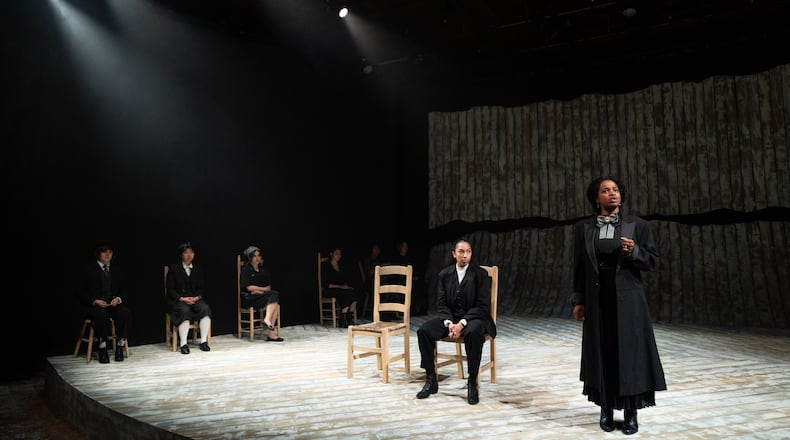This story was originally published by ArtsATL.
A visually dazzling, inventively staged production of Federico Garcia Lorca’s tragedy “Blood Wedding,” performed by a mix of 16 female and nonbinary Emory University students and professional actors, runs until Nov. 19 at the Mary Gray Munroe Theater on campus.
The script, translated by the poet Langston Hughes and adapted by Melia Bensussen, addresses how perpetual cycles of violence plague people who seem incapable or unwilling to escape the doom caused by knives and weapons. The 1932 Spanish play’s argument is that we as a people have learned these deadly lessons over and over. How much loss must we sustain before we stop killing each other?
Credit: Casey Gardner Ford
Credit: Casey Gardner Ford
The topic is certainly timely, yet, sadly, there has never been a time in human history when it wasn’t relevant.
The way the play addresses these themes is through an emotional, compelling story of a doomed love triangle, yet the characters -- only one of whom has a name -- also speak poetically about the themes in an allegorical way.
This leads to a mix of performance styles on the stage. Some actors play up the dynamic emotions of their characters, while others seem to speak in proclamation about the general ideas, as though they are espousing moral lessons with detachment. The ones who fare best and draw the sympathy of the audience are the ones who enrich their characters with feeling, playing the story as well as its larger contexts.
The show opens with a young man (Ashley Alves) announcing to his chatty, overprotective mother (Dionna D. Davis) that he plans to marry a nice, pure girl (Andreanna Kitas) from a nearby farm. He also asks his mother for a knife so that he can tend to his vineyard.
The mother has cause to be concerned at both instances, for the boy’s father and older brother were once killed in this town by the knives of the Felix family. And the prospective bride once dated Leonardo Felix (Emma Clapp), though Leonardo is now unhappily married to another woman (Kaylah Holmes).
Credit: Casey Gardner Ford
Credit: Casey Gardner Ford
As news of the wedding spreads to Leonardo, his passion for the bride leads to dire consequences for the entire town.
Davis is absolutely fantastic here, beginning the show on a bitter, tense note and letting it build throughout the play into anger and dread. Her doubt of the girl’s decency reads at first like amusing jealousy. Yet the mother is wise about the human inclination to doom itself. Davis gets the last laugh in the play, and it’s quite devastating.
Other older, savvy characters also try to warn the young lovers to be careful. As a servant who understands how minor indiscretions can explode, Patty De La Garza speaks and sings with an aching, beautiful voice to try and stop the tragedy, and we feel her sorrow. Wanyu Yang, playing the bride’s father and a glittering embodiment of the all-seeing Moon at different points, delivers a layered performance in both roles.
As the girl torn between two lovers and two futures, Kitas delivers strong work. At the climax, Kitas and Davis share a particularly effective confrontation scene filled with emotion as they compare personal losses. Holmes also has good moments as the wronged wife.
Alves plays the wannabe groom with youthful spunk and a blithe naivete that works well for the character at points. Clapp is also good when playing sullen disappointment about Leonardo’s failing marriage.
When Leonardo wrongs the groom in the second act, though, Alves and Clapp don’t effectively play up their characters’ anger and passions in those scenes. Other characters during these scenes -- passersby spreading gossip or communicating about fate -- aren’t as emotional either. They act like pawns in a fable instead, which may be a valid reading of the material but is less involving to watch.
But the direction by Lee Osorio is masterful here. Throughout the show, the director populates the entire stage with townsfolk who serve as a chorus of witnesses to the tragedy. When the tension needs to build at different points, the townsfolk circle with their chairs, mutter asides or pound out a percussive rhythm. Osorio builds the atmosphere around the main action and characters in that way, creating stage pictures that are always interesting.
The set by Sara Culpepper and lighting design by Toni Sterling are gorgeous. The wood planks and the dirt floor suggest a bleak, barren life for this town.
Additionally, cellist Deisha Oliver provides a score that underlines the doom.
The characters are also dressed monochromatically by costume designer John Merritt, so that when the title’s splash of red makes its appearance, it’s particularly effective.
Also, very little violence is actually depicted within this production, which is an effective choice, given the message of the piece. The play needs not to depict or glamorize more acts of violence while condemning it.
THEATER REVIEW
“Blood Wedding”
Through Nov. 19. $5-$20. Mary gray Munroe Theatre, 630 Means Drive, Alumni Memorial University Center, Atlanta. theater.emory.edu.
::
Benjamin Carr, a member of the American Theatre Critics Association, is an arts journalist and critic who has contributed to ArtsATL since 2019. His plays have been produced at the Vineyard Theatre in Manhattan as part of the Samuel French Off-Off Broadway Short Play Festival and at the Center for Puppetry Arts. His novel, Impacted, was published by The Story Plant in 2021.
Credit: ArtsATL
Credit: ArtsATL
MEET OUR PARTNER
ArtsATL (www.artsatl.org), is a nonprofit organization that plays a critical role in educating and informing audiences about metro Atlanta’s arts and culture. Founded in 2009, ArtsATL’s goal is to help build a sustainable arts community contributing to the economic and cultural health of the city.If you have any questions about this partnership or others, please contact Senior Manager of Partnerships Nicole Williams at nicole.williams@ajc.com.
About the Author
Keep Reading
The Latest
Featured





